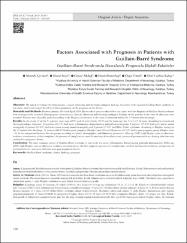Factors associated with prognosis in patients with guillain-barré syndrome [Guillain-Barré Sendromlu Hastalarda Prognozla İlişkili Faktörler]
Özet
Objective: We aimed to evaluate the demographic, clinical, laboratory and electrophysiological findings of patients with inpatient Guillain-Barré syndrome in our clinics and to investigate the effect of these parameters on the prognosis of the disease. Materials and Methods: Between January 2014 and April 2018, file records of patients admitted to our clinics with the diagnosis of Guillain-Barré syndrome were retrospectively reviewed. Demographic characteristics, clinical, laboratory and electrophysiological findings of the patients at the time of admission were recorded. Patients were clinically graded according to the Hughes classification at the time of admission and on the 3rd month after discharge. Results: In the study, 25 of the 51 patients were male (49%) and 26 were female (51%) and the mean age was 54.21±17.32 years. According to clinical and electrophysiologic diagnosis, 34 patients (66.7%) had acute inflammatory demyelinating polyradiculoneuropathy, 9 patients (17.6%) had acute motor axonal neuropathy, 6 patients (11.8%) had acute motor sensory axonal neuropathy and 2 patients (3.9%) had Miller Fisher syndrome. According to Hughes scoring on the 3rd month after discharge, 31 patients (60.8%) had in good prognosis (Hughes score ?2) and 20 patients (39.2%) had in poor prognosis group (Hughes score >2). In the comparison between the two groups according to clinical, demographic, and laboratory parameters, older age (?50), high Hughes score at admission, weakness in extremities as first complaint, the presence of complications, need for mechanical ventilation and presence of gastroenteritis as a leading infection were evaluated as prognostic factors. Conclusion: The most common variant of Guillain-Barré syndrome in our study was acute inflammatory demyelinating polyradiculoneuropathy. Older age (?50), high Hughes score at admission, weakness in extremities as the first symptom, presence of complications, need for mechanical ventilation, and presence of gastroenteritis as a precursor infection were poor prognostic factors. © 2019 by Turkish Neurological Society.
















